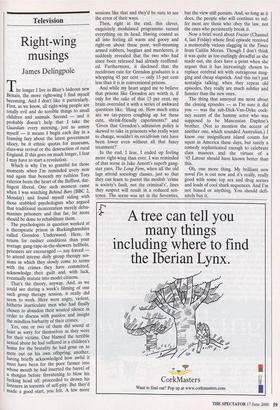Television
Right-wing musings
James Delingpole
The longer I live in Blair's hideous new Britain, the more right-wing I find myself becoming. And I don't like it particularly. First, as we know, all right-wing people are totally evil and do terrible things to small children and animals. Second — and it probably doesn't help that I take the Guardian every morning, just to annoy myself — it means I begin each day in a foaming fury about the latest government idiocy, be it ethnic quotas for museums, class-war revival or the destruction of rural England. If this goes on much longer, I fear I may have to start a revolution. Which is why I'm so grateful for those moments when I'm reminded every now and again that beneath my ruthless Tory exterior beats the heart of the fluffiest, dar- !Ingest liberal. One such moment came when I was watching Behind Bars (BBC 2, Monday) and found myself siding with those stubbled psychologists who argued that traditional incarceration merely dehu- manises prisoners and that far, far more should be done to rehabilitate them.
The psychologists in question worked at a therapeutic prison in Buckinghamshire called Grendon Underwood. Here, in return for cushier conditions than your average gang-rape-in-the-showers hellhole, prisoners are encouraged — nay forced — to attend intense daily group therapy ses- sions in which they slowly come to terms With the crimes they have committed, acknowledge their guilt and, with luck, eventually mutate into model citizens. That's the theory, anyway. And, as we could see during a week's filming of one such group therapy session, it really did seem to work. Here were angry, violent, hitherto inarticulate men who had finally chosen to abandon their wonted silence M order to discuss with passion and insight the mindless barbarity of their crimes. Yes, one or two of them did sound at least as sorry for themselves as they were for their victims. One blamed the terrible sexual abuse he had suffered in a children's home for the brutality he had gone on to mete out on his own offspring; another, having briefly acknowledged how awful it must have been for the poor farmer into Whose mouth he had inserted the barrel of a shotgun before threatening to blow his flicking head off, proceeded to drown his listeners in torrents of self-pity. But they'd made a good start, you felt. A few more sessions like that and they'd be sure to see the error of their ways.
Then, right at the end, this clever, exquisitely modulated programme turned everything on its head. Having coaxed us all into feeling all warm and gooey and right-on about these poor, well-meaning armed robbers, burglars and murderers, it suddenly revealed that the two who had since been released had already reoffend- ed. Furthermore, it disclosed that the recidivism rate for Grendon graduates is a whopping 45 per cent — only 15 per cent less than it is in conventional prisons.
And while my heart urged me to believe that prisons like Grendon are worth it, if only for the sake of that 15 per cent, my brain overruled it with a series of awkward questions like: 'Hang on. How much extra are we tax-payers coughing up for these cute, shrink-friendly experiments?' and 'Given that Grendon's admission policy is skewed to take in prisoners who really want to change, wouldn't its recidivism rate have been lower even without all that fancy treatment?'
In the end, I fear, I ended up feeling more right-wing than ever. I was reminded of that scene in Jake Arnott's superb gang- ster yarn, The Long Firm, when all the old lags attend sociology classes, just so that they can learn to parrot the modish 'crime is society's fault, not the criminal's', lines they suspect will result in a reduced sen- tence. The scene was set in the Seventies, but the view still persists. And, so long as it does, the people who will continue to suf- fer most are those who obey the law, not the ones who persistently break it.
Now a brief word about Frazier (Channel 4, last Friday) whose final episode received a memorably vicious slagging in the Times from Caitlin Moran. Though I don't think it was quite as toe-curlingly dreadful as she made out, she does have a point when she argues that it has increasingly chosen to replace cerebral wit with outrageous mug- ging and cheap slapstick. And this isn't just nostalgia talking: when they repeat old episodes, they really are much subtler and funnier than the new ones.
The thing that annoyed me most about the closing episodes — as I'm sure it did you — was the sub-Dick-Van-Dyke cock- ney accent of the hammy actor who was supposed to be Mancunian Daphne's brother. (Not to mention the accent of another one, which sounded Australian.) I know our insignificant island counts for squat in America these days, but surely a comedy sophisticated enough to celebrate class nuances and the virtues of a '45 Latour should have known better than this.
Oh, one more thing. My brilliant new novel Fin is out now and it's really, really good with some top sex and drug scenes and loads of cool shark sequences. And I'm not biased or anything. You should defi- nitely buy it.










































































 Previous page
Previous page